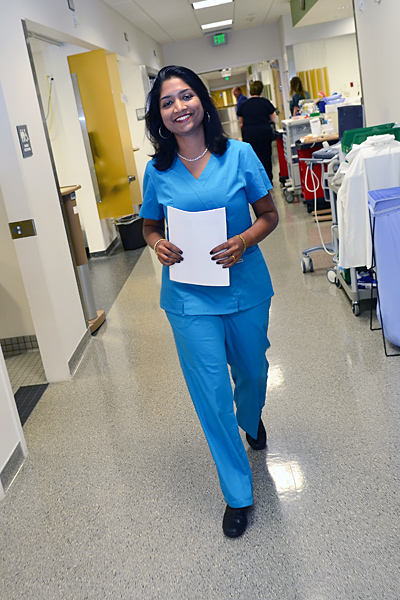
For reasons not yet understood, African Americans have the highest incidence of colorectal cancer of all ethnic groups in the U.S.
Kent Robinson prefers to remember his father as the robust, active man who would be the first to scramble to the top of a roof to make a needed repair.
“He went from construction and fixing roofs to bedridden not too long after his diagnosis,” said Robinson, whose 86-year-old father was diagnosed with metastatic colon cancer late last year after exploratory surgery.
Robinson, 42, flew home to Freeport, Bahamas, in December to help his family move his father from the hospital into a nursing home. “Before that he had never been to the doctor. When I saw him, he was skin and bones and had a colostomy bag,” he said. “The change hit me like a ton of bricks.”
A nurse at the nursing home suggested that Robinson and his six older siblings – five brothers and one sister — get screened for colorectal cancer. “She said all you guys should really get checked out. This cancer can be very hereditary.”
Robinson pushed the recommendation aside for several months after returning home to Tampa. His younger sister had died of breast cancer at age 35, and two cousins on his father’s side had also died of cancer. But, Robinson figured he was healthy, didn’t smoke or drink and exercised routinely.
Then, while visiting his primary care physician at USF Health for a routine physical, the doctor emphasized the need for early screening because Robinson’s family history heightened his risk. “I decided I needed to just do it,” Robinson said.
* * *
During Robinson’s screening colonoscopy in early March, USF Health gastroenterologist Dr. Arthi Sanjeevi removed two precancerous growths, or polyps, from the inner wall of his colon. One, the size of a dime, could have turned into cancer “if he had not sought timely screening,” said Dr. Sanjeevi, an assistant professor of gastroenterology in the USF Health Division of Digestive Disorders and Nutrition.
Dr. Sanjeevi told Robinson she was glad he came in when he did.

USF Health gastroenterologist Dr. Arthi Sanjeevi speaks with patient Kent Robinson on a follow-up visit.
Dr. Sanjeevi points to a long-term study, published earlier this year in the New England Journal of Medicine, which found that colonoscopies not only prevent colorectal cancers, but dramatically cut deaths from the disease.
Dr. Sanjeevi has heard all the reasons why people do not get colonoscopies, a somewhat involved and invasive test that uses a lighted instrument to examine the rectum and complete colon. They’re embarrassed; they don’t want to go through the prescribed bowel cleanse with laxatives the day before the screening; they’re afraid of a bowel perforation (an extremely rare complication when the procedure is performed by an experienced colonoscopist). She says she even had to persuade her parents to get screened after her aunt was diagnosed with colon cancer in her 70s.“One misconception is the idea that you’re protected if you have no family history of colorectal cancer,” she said. “But, if you take all comers with colon cancer, only 5 percent actually had a family history.”
* * *
The U.S. Preventive Services Task Force recommends screening for colorectal cancer beginning at age 50, although screening should begin at an earlier age for those with risk factors such as a family history of polyps or colorectal cancer. Screening tests include colonoscopy, sigmoidoscopy, stool blood tests, stool DNA, CT colonography (virtual colonoscopy) and barium enema. However, Dr. Sanjeevi said, colonoscopy is still considered the preferred method because it is the only test that both detects and removes precancerous polyps during the same exam.
While there has been an unprecedented decline in the overall incidence and death rates from colorectal cancer in the last several years, several studies have shown an increase for patients younger than 50, most significantly among those ages 40 to 44. An epidemiological study published last year by Dr. Jorge Marcet and colleagues at the USF Health Department of Surgery (Journal of the American College of Surgeons) suggests lowering the recommended age for beginning colorectal cancer screening to 40, “an age at which the incidence mirrors other accepted screened cancers.”

Dr. Sanjeevi stands beside a monitor displaying a precancerous colon polyp, which was removed during a screening colonoscopy.
In addition, for reasons not yet understood, African Americans have the highest colorectal cancer incidence and death rates of all ethnic groups in the United States. Both the American College of Gastroenterology and the American Society for Gastrointestinal Endoscopy recommend that African Americans begin screening at age 45.
“More recently, data has indicated that colorectal cancer may start at an earlier age and progress more aggressively in African Americans than in the general population,” Dr. Sanjeevi said. “There’s increasing evidence that that certain ethnic subsets, including African Americans may have a higher prevalence of genetic mutations resulting from microsatellite instability in their tumors.”
Microsatellite instability — a key factor in colorectal, endometrial, gastric and other cancers — arises when damaged DNA is replicated due to defects in the normal DNA repair process. This leads to inactivation of major tumor suppressor genes that regulate cell growth and prevent cancer.
* * *

Robinson will continue to monitor his health for any signs of colon cancer (change in bowel habits, constipation, diarrhea, blood in the stool, etc.) and return for a follow-up colonoscopy in five years. In the meantime, he’s working on convincing his older siblings to get screened for colorectal cancer.
He cherishes more than ever the time spent with his 7-year-old daughter Aladrienne. “I wouldn’t want my life cut short when I could be spending it with her,” Robinson said. “I want to see her graduate high school, go to college and walk her down the aisle.”
The message he wants others to hear is one he’s taken to heart: Do everything you can to avoid the risk of being diagnosed with colorectal cancer in the advanced stages when the disease is more difficult to treat, he said. “Don’t be embarrassed to get a colonoscopy. It’s a medical procedure, and it’s better to know than not know.”

Photos by Eric Younghans, USF Health Communications
Thorough bowel prep needed for optimal colonoscopy results
If you don’t have an effective preparation of the bowel, the results of your screening colonoscopy won’t be optimal, says USF Health gastroenterologist Dr. Arthi Sanjeevi. “The prep needs to be high quality so that any polyps, big or small, can be detected.”
Bowel preparation for colonoscopy refers to laxatives taken before the procedure to cleanse the colon of all fecal debris. If you’re insides aren’t as clean as possible, it’s harder to for the camera at the tip of the colonoscope to “see” polyps, especially the harder-to-detect flat kind, or even a small cancer.
How can you maximize your chances of an effective bowel preparation? Dr.Sanjeevi suggests the following:
- Ask if the doctor might recommend split dosing. Split dosing refers to taking half the prescribed laxative the night before the colonoscopy and the other half on the day of the procedure (6 to 8 hours before the colonoscopy). Several studies have shown that split dosing significantly improves the quality of preparation for colonoscopy. Taking the entire laxative the night before a colonoscopy is good for flushing out fecal debris, but the large lag time leaves the potential for intestinal secretions from the small intestine to enter the right side of the large intestine between the end of the bowel prep and the start of the colonoscopy. This right side is critical to view because cancers commonly develop here.
- Start eating a low-fiber diet three to four days before your colonoscopy. Avoiding high-fiber foods, like whole grain cereals, nuts, raw or leafy vegetables and fruits, will help clean out the large intestine.
- Take a daily stool softener, such as Colace or ducolax, beginning the week before your procedure.
- Stay away from all solid foods after breakfast the day before your colonoscopy and adhere to the recommended clear liquid diet. That includes no dark or colorful liquids such as red or purple fluids, or heavier beverages such a milk or smoothies that may stick to the walls of the digestive tract and impair visibility.
